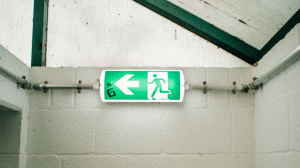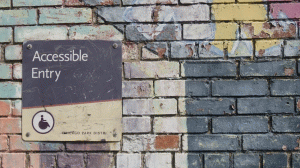I've only known this for a while: we're not as progressive and advanced as we like to pretend. It's been a while since I wrote about some recent sexist incident with the widely circulated words about it, "Knock knock, the 50s want their image of women back!" But... actually, it's simply a misreading of reality that things we think we've long since left behind are factually still part of our reality. "But it shouldn't happen nowadays" is a valid wish, but simply denies reality.
And it is actually similar with our brain and cognition. As complex and sophisticated as these systems may be, our reactions and behaviors are often not very adapted to reality and current circumstances.
The amygdala is the part of our brain that, among other things, plays an important role in the generation of fear, anger and other emotions. And now it is such a thing with fear (and all other feelings). I am a great advocate of "all feelings are valid". And fear in particular has an unjustified bad reputation. One of the reasons for the lousy image of fear, is that we live in a society where it is considered desirable to be brave and confident and competent and reasonable, and we think this is incompatible with being fearful. We associate fear with weakness, with despondency, with irrationality, with effeminacy - and so it happens that quite a few people find it an insult when they are accused of being fearful. Being fearful is considered the opposite of being cool. We associate fear with missed opportunities, wasted potential; especially in the case of our children, we are concerned (!) that their fears might stand in their way of developing freely. Yet fear is such a multi-dimensional thing. We experience fear mainly in its aspect of helplessness, the aspect of threat, the absence of security or the aspect of loneliness. Yet fear has other aspects as well: Excitement, adventure, curiosity but also protection, care and reason. Fear has the very important function of making us aware of danger, but also of the unknown. Fear shows us where our comfort zone ends and where we need to go to experience adventure. Without fear, there's no thrill - and no rationality, either, because it's fear that gives us the impetus to weigh risk versus safety.
And while I know that our feelings are always telling us something important, that needs our attention, it's not always telling us the truth. When I'm angry, it may be that I'm being wronged right now. But it can also be that there is simply a moralistic judgment behind my anger, for example, when I have a certain (not or moderately justified) idea of what other people should do or not do, but they don't comply. And when I am fearful, it can be that there is danger. But it can also be simply a learned thought pattern. But the amygdala does not differentiate, it does it's job and triggers processes that, among other things, have to do with adrenaline, stress and alertness, and result in a fight-flight-freeze reaction more often than we would like: To face the (perceived) danger, we go into fight mode, flight mode, or freeze mode. And that can be a cat biting its own tail.
A favorite response of mine to confront danger is flight - and it takes the form of procrastination. We know: Procrastination has nothing to do with laziness, but much more to do with things like fear of failure, Executive Dysfunction, overwork, perfectionism, and in my case, beliefs like, "I can't do this," "I'm not good enough," "What I'm doing isn't relevant anyway." Is the danger real, is the fear justified? My amygdala says, "OMG YAAAAA!!! 🚨 🚨 🚨" But when I consider, for example, the panic that takes over every month when this column is due, causing it to take me ten times longer than it would if I could just get started without fear, and match it later with the result, which I'm quite happy with after all, I wish I could remember: "The task 'writing a column' does not belong in the amygdala."
But my amygdala needs a deep decluttering in many ways. All the unwarranted stuff that's bouncing around there!
- Unanswered messages or mails (Feeling: Shame. Reaction: freezing/dying in the form of first-right-not-answers)
- Conflicts with the son or the partner (Feeling: stress. Reaction: fight)
- Silence and idleness (feeling: anxiety. reaction: flight in the form of being constantly busy)
In other people, (perceived) danger coping may translate into People Pleasing (Feeling: Anxiety. Reaction: Freezing in the form of self-denial), Blackouts when speaking in front of others (Freezing), or authoritarian behavior toward colleagues (Feeling: Insecurity. Reaction: Fight in the form of aggression).
The Fight-Flight-Freeze reaction is not a decision, but an automatic process in our brain. However, this does not mean that we are helplessly at its mercy. We can practice questioning our thinking habits and beliefs, which have a lot to do with alarmism and catastrophizing, bottom line:
- "If I don't take action immediately, things will spiral out of control."
- "If I don't respond immediately, they think I'm a deadbeat who can't even get it together to answer messages/emails in a timely manner."
- "When I speak my mind, everyone turns their backs on me."
- "If I don't work these extra hours, I may lose my job."
Even though our lives often don't feel like it: most of the time, there's no real danger at all. But we don't even get that far in realizing that, because our reactions are usually not conducive to equalizing these situations so that real problems can then actually arise. We haven't even learned to pause for a moment to find a response instead. But the more often we practice it, the more often we will succeed. Psychologist Viktor Frankl once said:
"Between stimulus and response lies a space. In that space lies the power of our choice. In our reaction lies our development and our freedom."

And from psychologist and family counselor Laura Markham, I have this mantra hanging (just like Frankl's quote) on a Post-it above my desk. Markham's is really about challenging situations with the child, but it can actually be applied to large parts of life. The child doesn't want to brush their teeth? "It's not an emergency." They’re fighting with the sibling? "It's not an emergency." There's a conflict with a colleague? "It's not an emergency." The ex writes a nasty text message? "It's not an emergency." Many of these situations need a response, but they don't necessarily need an immediate reaction. We didn't learn it that way and our stress level says otherwise, but most of the time it the situation is not that urgent so we really couldn’t pause and take the time to consider how we want to act. The wonderful Tara Brach talks about "the power of interruption": Pausing. Reviewing. Re-tracing. Interrupting old patterns, breaking them. Response.
I also really love this short video by Marshall Rosenberg, the founder of Nonviolent Communication, in which he explains in a way that is as tragic as it is funny why it is so important that we take the time to act from the energy we choose to act from, not the energy we have been socialized to act from:
Pause. Take your time. It's not an emergency. 🙏🏽
---
In this column, presented in collaboration with our friends from Wildling Shoes, we want to give more space and visibility to the issues of anti-discrimination, belonging, and intersectionality in the workplace. Through articles, interviews, and diverse perspectives, we aim to both challenge and inspire those working in the impact sector - while encouraging them to create authentically lived workspaces that foster more belonging and less discrimination. By gaining new perspectives and engaging in a shared dialogue, we can take a collective step toward radical systems change in the impact sector - from "power over" and "power for" to "power with."
Our columnist for 2022 is Sohra Behmanesh. She lives with her family in Berlin, works as a freelance anti-racism trainer, and finds caring and empathy just as superb as intersectionality.
You can find more Belonging articles here.

Photo: Kris Wolf









